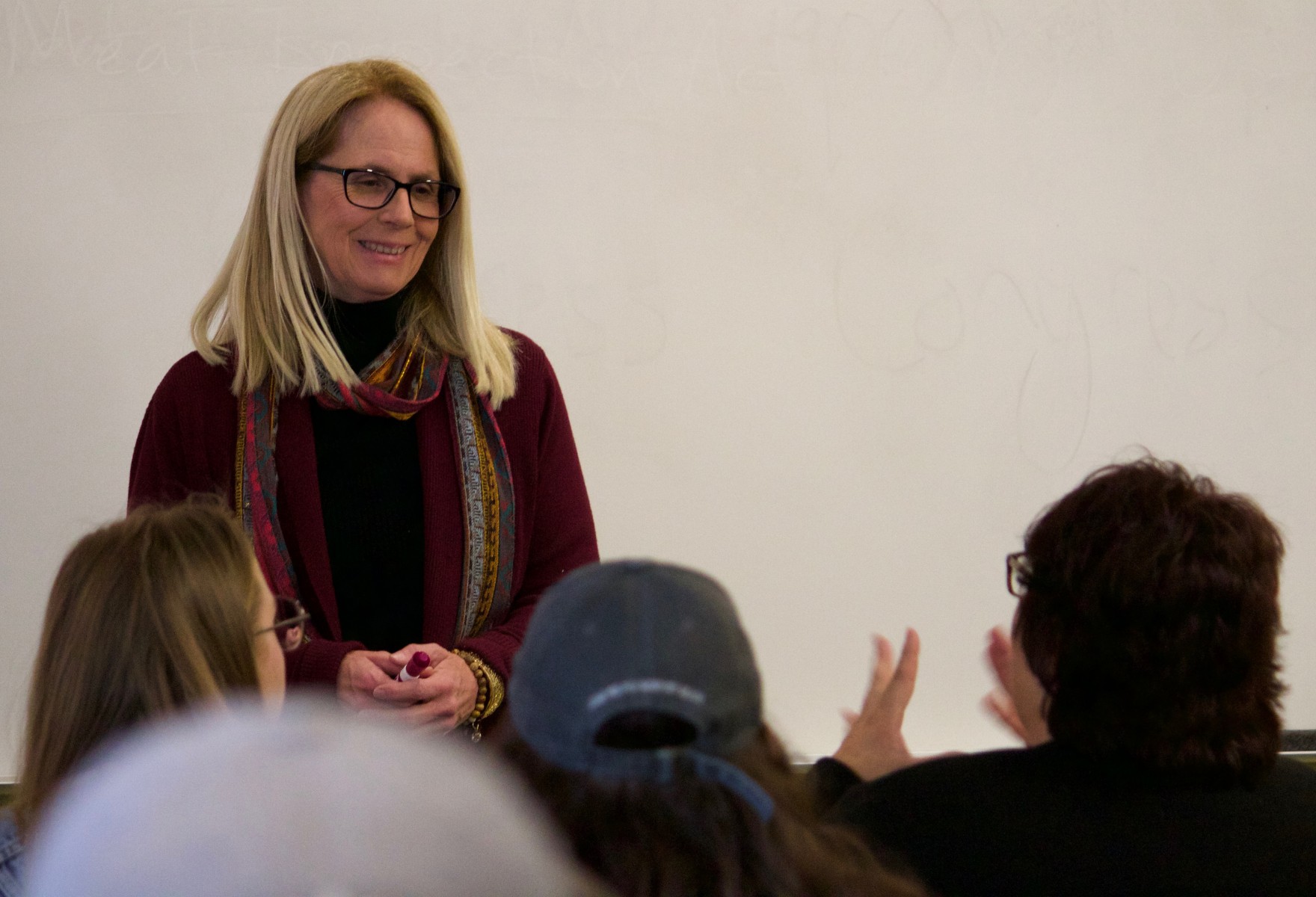University Roots Run Deep for History Professor
By Eric Breier
Jill Watts still remembers her first trip to the city of San Marcos.
A native San Diegan, Watts was 10 years old when she made the long journey with her mother from their Southeast San Diego home to a chicken ranch in San Marcos.
Watts’ father was an elementary school teacher who had taught a lesson that required students to reconstruct a chicken skeleton. He wanted to replicate the lesson for the Elementary Institute of Science, which grew out of the science club he started at Kennedy Elementary School in San Diego.
The only place to get whole-body chickens at the time was the Prohoroff Poultry Farm, destined to become the site of Cal State San Marcos.
“It was a trek in those days,” Watts said. “We came out here and drove up to where the McMahan House is now. There was a house there and this guy brought out these whole-body chickens in a box on ice and put them in the trunk. I remember it being so dusty and hot.”
Little did Watts know at the time that she would one day return to that site to help college students pursue their degrees.
Watts witnessed firsthand CSUSM’s transformation from occupying space in a strip mall to a 300-acre campus on land that previously was home to one of the world’s largest chicken ranches. She has been a history professor at CSUSM since the University’s early days and is currently the department’s coordinator of graduate students. She arrived in fall 1991 and taught her first CSUSM classes in January 1992.
As one of the first history faculty hired at CSUSM, Watts helped shape the department’s curriculum. She said the history department has had a global emphasis from the beginning while also committing to courses on gender and race.
“We’ve had a really rich curriculum in the department, and it’s because we’ve worked together on it,” she said.
Watts was recently honored with the 2017-18 Harry E. Brakebill Distinguished Professor Award, given annually to a CSUSM faculty member who embodies excellence in teaching, research and service.
Watts has authored three acclaimed books, two of which – “Hattie McDaniel: Black Ambition, White Hollywood” and “God, Harlem U.S.A.: The Father Divine Story” – have been optioned for film. She has a fourth book due out early next year about Franklin D. Roosevelt’s “Black Cabinet,” a group of African American policy advisers to the president from 1933-45.
Watts said she doesn’t pick the topics for her books so much as they tend to pick her.
The Father Divine book came about after Watts was given the topic as part of a graduate seminar assignment. Her second book, “Mae West: An Icon in Black and White,” came about because she wanted to learn the answer to a question asked by a student about the Hollywood legend.
While working on the Mae West book, Watts was struggling to find information she needed about McDaniel, which led her to write her third book.
Though Watts enjoys researching and writing the books, teaching remains her priority.
“That’s always foremost in my life,” she said. “The great thing about our faculty is that for all of us, it’s students first.”
That’s something Watts said has remained constant throughout CSUSM’s nearly three decades, and it’s what she found so attractive about the job at a time when the University was not exactly a typical college campus.
When Watts was brought out to interview in 1991, she knew that the University was using temporary quarters while the campus was under construction. But when they drove her to those temporary quarters, her reaction was, “They’re in a strip mall?”
As part of her visit, Watts was taken to where the main campus would be built, and she realized it was the same place she had visited on a hot summer day as a 10 year old. The chicken ranch was long gone, but there still wasn’t much in its place.
“It was just dirt,” she said. “Just a dirt plot. There was nothing. They were starting to grade it. But they had this idea that it was going to be this huge, amazing university. They all could see it.”
At that moment, driving across the freeway from classrooms in a strip mall to an empty dirt plot, Watts wasn’t so sure.
But she could see that everyone affiliated with the University was invested in the students.
“They didn’t all agree on everything at the beginning at all,” Watts said. “But they all agreed on their commitment to the students, so it was really attractive to join their experiment.”
And Watts is glad she did. She said the vision for the students has remained consistent throughout her 26 years at the University.
“The commitment has always been there and students have always come first,” she said. “That’s the spirit and soul of the campus.
“There’s something about the students now that reminds me so much of the students at the beginning. Maybe it’s the times we’re living in, but there’s just such genuine curiosity, such desire to leave here and serve communities, to go beyond self and think of others. Our students have always been amazing, and they’re not just amazing because they’re great students. They’re just the best people. To see them become their best selves when they’re with us, it’s just such an honor to be part of their lives.”
Learn more about CSUSM's history department or Master of Arts in history online.
Media Contact
Eric Breier, Public Affairs Specialist
ebreier@csusm.edu | Office: 760-750-7314



